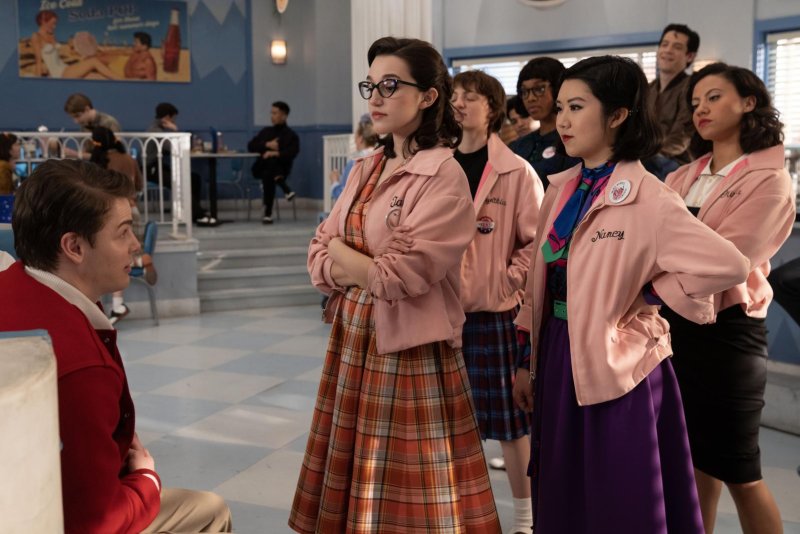1 of 5 | From left, Jason Schmidt, Marisa Davila, Ari Notartomaso, Shanel Bailey, Tricia Fukuhara,, Alexis Sides and Cheyenne Wells star in "Grease: Rise of the Pink Ladies." Photo courtesy of Paramount+
LOS ANGELES, March 30 (UPI) -- Grease is a classic, but it has some outdated gender issues more reflective of when it was written than the fact that it was set in the '50s. Grease: Rise of the Pink Ladies, premiering April 6 on Paramount+, addresses those issues head-on in a fun, original musical series.
In 1954, Jane (Marisa Davila) is relatively new in town, in her second year at Rydell High. The rumor mill at Rydell starts mocking Jane for going all the way with her boyfriend, Buddy (Jason Schmidt).
Jane breaks up with Buddy and runs for student president against him. Then, Jane teams up with Rydell outcasts Olivia (Cheyenne Isabel Wells), Nancy (Tricia Fukuhara) and Cynthia (Ari Notartomaso) and the greasers led by Richie (Jonathan Nieves) for her campaign.
The musical play and movie Grease encouraged Danny to hook up with Sandy while chastizing her for being anything less than virginal. Meanwhile, Sandy's makeover was to turn into a leather sexpot, while Rizzo had a pregnancy scare.
Rise of the Pink Ladies creator Annabel Oaks knows there was something unfair about both the '50s, and the '70s when the show was first produced. Not that it's all fair now, but at least Oakes can create a show in which women take some of the power back.
The parents of Rydell dismiss Buddy and the gang's behavior as "boys will be boys," while expecting Jane and her friends to reflect positively on their families. Olivia had an affair with a teacher, but she's the one ostracized and punished for it.
Even during the student election campaign, Jane faces criticism for sounding shrill or scolding the voters. They don't say it explicitly, but Buddy is the candidate "you would want to have a beer with," for lack of a better term.
The girls also retaliate against the boys trying to get them drunk to lower their defenses. Cynthia challenges stereotypes of femininity by aspiring to be a greaser herself. Today, she might even go so far as to explore nonbinary gender identity, but in the '50s she's a tomboy.
Rise of the Pink Ladies also addresses racism. Jane's family is half Puerto Rican and half Italian. They emphasize the Italian half to be accepted in the community, but speak Spanish in the home.
All of the above happens amid original songs and dance numbers. The first episode closes with a showstopper like a Broadway act break. This demonstrates what the show can be so you'll come back next week.
There are several new songs in each hour, and the premiere opens with a new arrangement of "Grease is the Word." One of Jane's solos in the school hall has ambitious choreography, including wirework.
The premiere episode has dance numbers in the greaser garage and home economics class, so it is playing the hits from the movie, too.
Rise of the Pink Ladies isn't just a prequel. These four main characters are the ones who started the Pink Lady gang from both movies.
The show reveals how Nancy designed the jackets and how the four agreed on the name. There are also a reasonable amount of Easter eggs for Grease, but the show doesn't overdo it.
Now that it's no longer controversial to acknowledge Grease 2 was actually good, Rise of the Pink Ladies joins the Grease franchise in expanding the classic with healthier gender norms. It's been 41 years since there was new Grease content, and Rise of the Pink Ladies is the word.
Fred Topel, who attended film school at Ithaca College, is a UPI entertainment writer based in Los Angeles. He has been a professional film critic since 1999, a Rotten Tomatoes critic since 2001 a member of the Television Critics Association since 2012 and the Critics Choice Association since 2023. Read more of his work in Entertainment.














